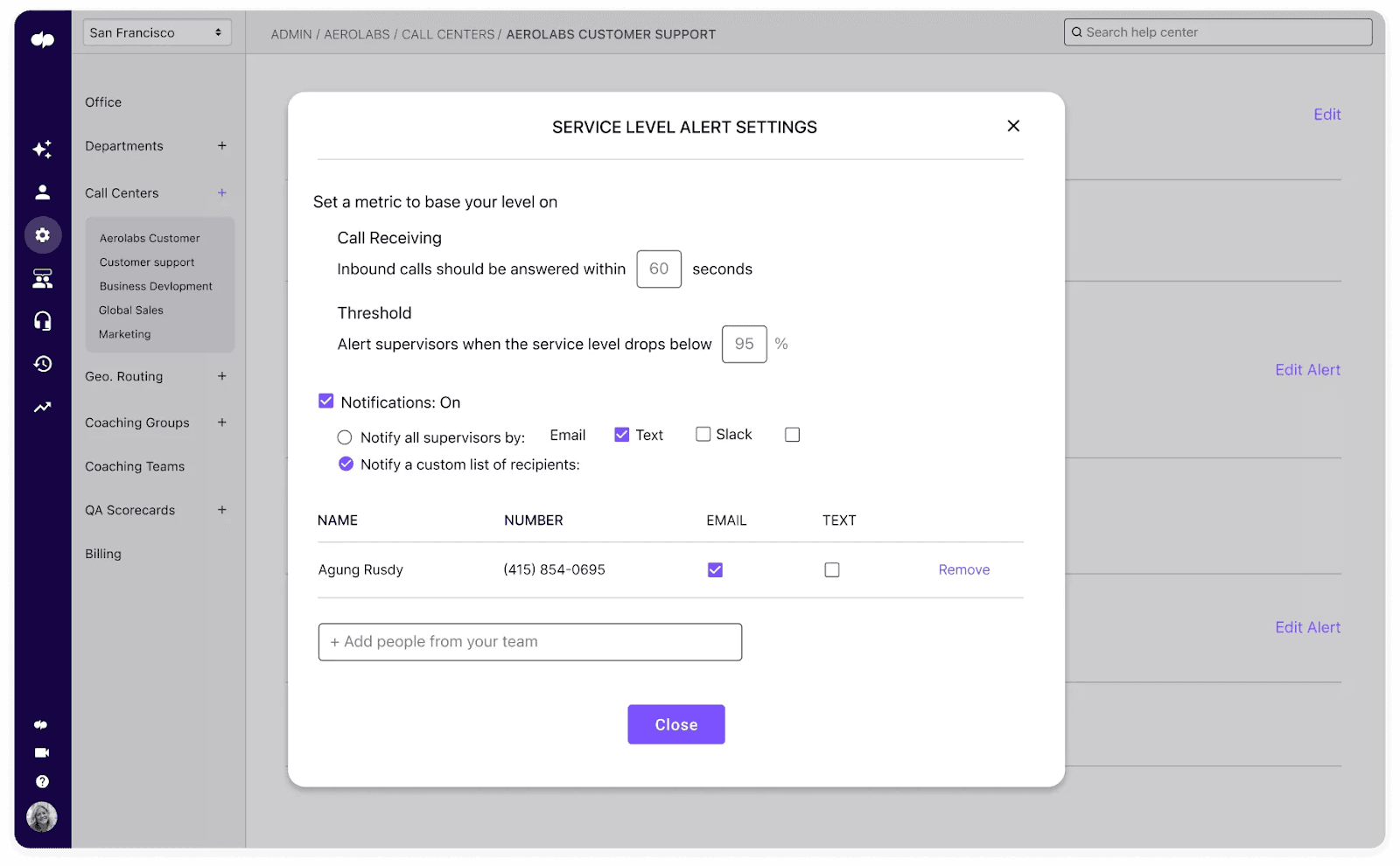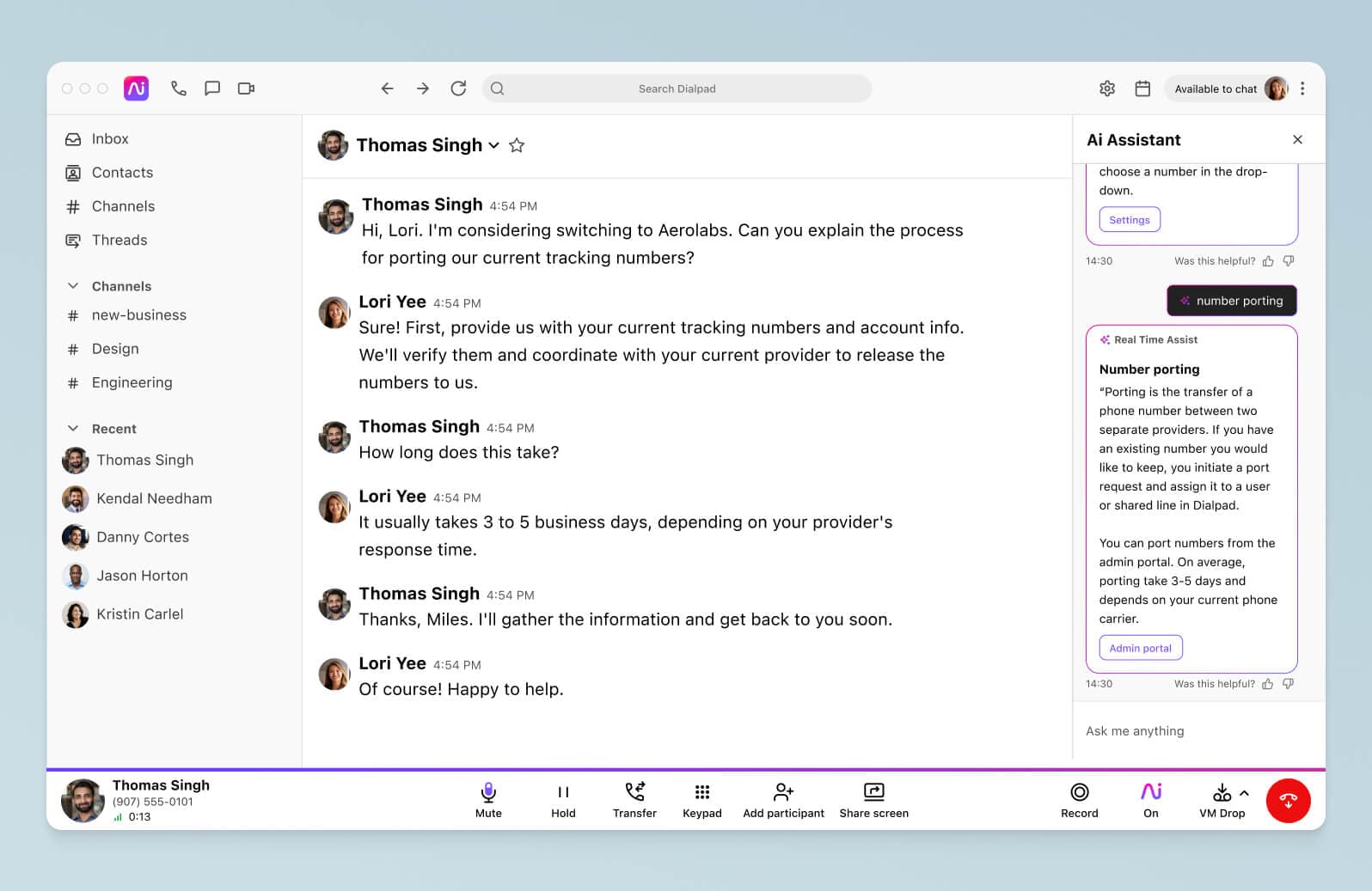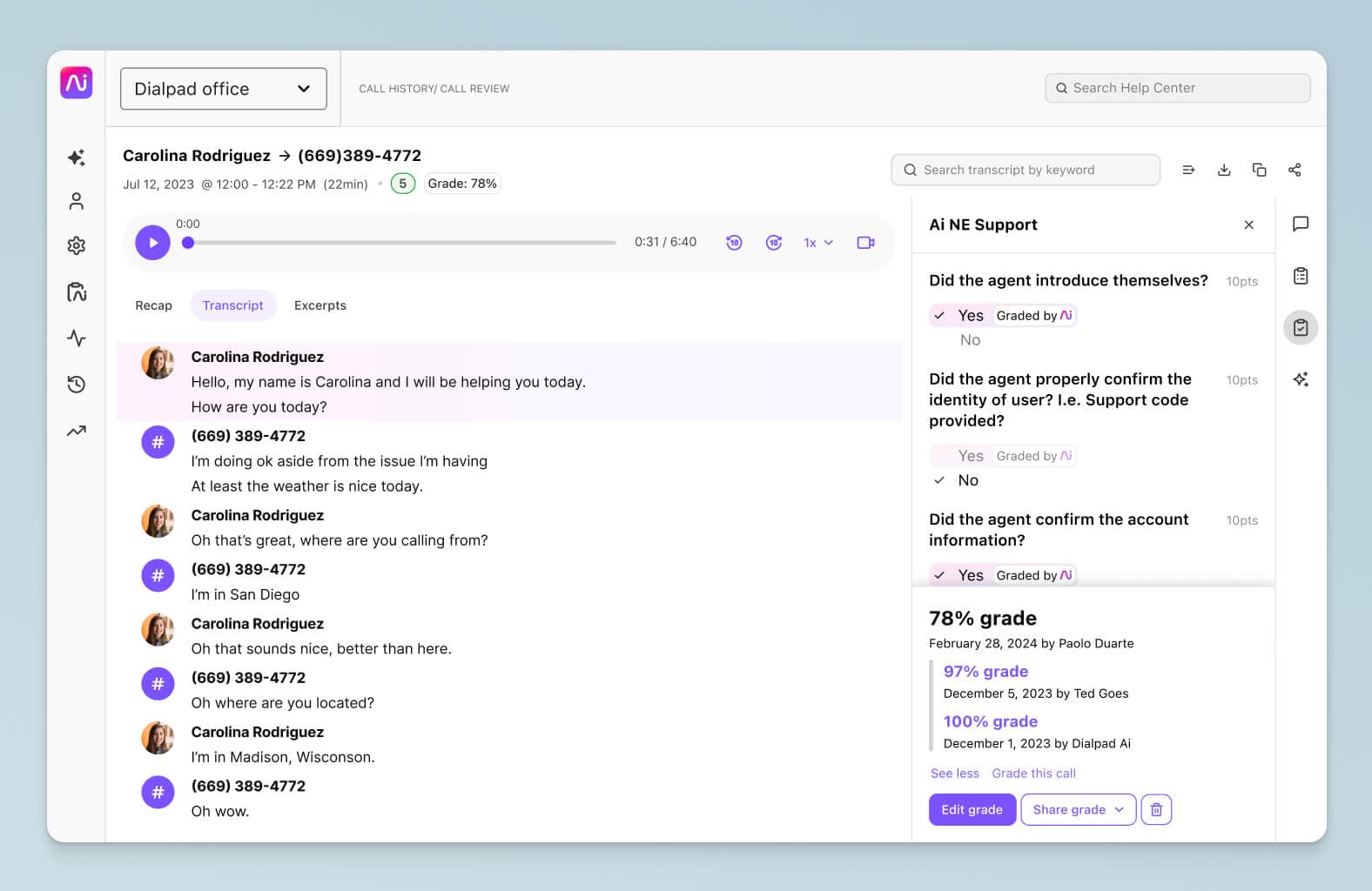Contact and call center coaching: Beginners vs tenured managers

VP of Customer Experience

Tags
Share
Call centre coaching has transformed from the traditional reactive once-a-month feedback meeting into a continuous experience that is increasingly supported by automations and Ai. And it’s no wonder—the bar for delivering personalised, efficient service rises by the year.
Not only that, but the employee turnover rate for call centres is notoriously high. Put simply, agents don’t feel happy and fulfilled in their roles.
Call centre agent coaching strives to improve employee’s skills, helping them deliver better customer service while meeting their own professional development goals. Coaching in a call centre has evolved to include everything from individual and group training to automation that empowers large-scale coaching delivery.
Let’s look into it.
What is call centre coaching?
Call centre coaching is the process of continuously training and upskilling call centre agents to maintain high performance levels.
For example, it might involve coaching new employees in the basics of handling calls or upskilling seasoned agents with fresh techniques and technologies.
There are lots of different approaches, too. You might hold group role-playing activities to boost your agents’ communication skills, or you might deliver one-on-one coaching sessions for individual goal-setting.
What about contact centre coaching? Is it different?
Contact centre coaching is the same as call centre coaching, except it’s not just aimed at agents who handle phone calls.
Contact centre training involves coaching agents across all of your customer support channels, like email, live chat, social media, and more.
We tend to equate contact and call centre coaching with customer support. However, you can also use contact and call centre coaching methods to train sales reps, HR support agents, and IT helpdesk employees. Really, any frontline staff who interact on your behalf with people outside your business.
5 Top tips for coaching call centre and contact centre agents
Want to create a call centre coaching plan template that actually drives performance improvements? Use these call centre coaching tips to guide you:
1. Use data to inform coaching
Call centre KPIs give you the performance insights you need to optimise coaching programs. They can uncover operational flaws or skills gaps that are causing poor performance.
Let’s say you notice a spike in average handling time (AHT). This could indicate a number of issues. Maybe agents are struggling to deliver prompt resolutions due to a skills gap. Maybe they spend too much time jumping between applications and software to find customer information, or maybe they find it difficult to explain technical support concepts in a clear, concise way.
To get to the bottom of it—and to figure out what you should focus on in your coaching program—you can leverage a mix of qualitative and quantitative data. For insights, look into things like:
Call transcripts
Customer satisfaction scores
Customer sentiment
Average hold time
Customer effort score
Average after-call work time
Occupancy rate
Of course, to access these metrics, you’ll need a contact centre platform that has built-in reporting and analytics. Dialpad Support, for example, has a centralised dashboard where you can see a range of contact centre metrics in real time and analyse historical data for insights.
You can even be automatically alerted when service levels drop below your acceptable standards:

2. Combine both real-time and retrospective coaching techniques
The retrospective coaching method—typical of more traditional coaching—means sitting down with agents at the end of the day, week, or month to evaluate their overall performance.
During a retrospective coaching session, you’ll use the data you’ve collected to discuss strengths and weaknesses, deliver feedback, and set goals.
It’s a sound call centre coaching technique. However, it lacks the continuous engagement and immediate support that improves the customer experience as it happens and drives professional growth. For this, you need to incorporate real-time coaching.
Real-time coaching is where call centre supervisors listen to agents’ live calls and coach them through conversations as they’re happening. With this approach, supervisors can promptly correct mistakes and provide live guidance, leading to faster improvements.
But how can you do this effectively if you’re supervising a team of agents who are all on the phone at the same time?
Traditionally, supervisors and managers would have to cycle through active calls, listening to a conversation for a minute or so before switching to the next call. It’s exhausting and doesn’t give you the full picture.
But imagine if you could oversee all of your agents’ live calls at once? Dialpad Support has features designed to do exactly that.
Real-time transcription gives you accurate transcripts of every active call. So, instead of having to listen in to calls individually, managers can monitor multiple calls by quickly scanning running transcripts for all calls in progress.

Dialpad Ai even analyses the sentiment of active calls. If a call is heading south, supervisors can see straight away that an agent may need coaching (or the call may need to be taken over) ASAP.

3. Make smart use of automation in call centre coaching
Have you considered supplementing your direct coaching with automated coaching? Automated coaching provides agents with additional support while granting supervisors more time to direct towards real-time coaching.
Providing you have an Ai-powered solution, there are several ways that you can implement automation into your call coaching.
Let’s say supervisors notice that agents struggle to answer questions about a product feature. Instead of coaching agents individually every time the topic comes up on a call, you can use Ai-powered agent assists.
Dialpad’s Ai Live Coach feature offers tailored, helpful notes that pop up on agents’ screens whenever challenging topics. Managers can set up Ai coaching for any topics they wish (for example, pricing questions or technical troubleshooting for certain features). They can also identify keywords that commonly lead to negative sentiments and pop up with handy tips to help agents navigate the call:

And then there’s the Ai Assistant. Rather than bombarding supervisors with questions—and having to wait for a response at the frustration of everyone involved—agents can seek help from Dialpad Ai.
Using generative Ai and the over seven billion minutes of business conversations it’s been trained on, Dialpad’s Ai Assistant can provide instant, contextually relevant answers to all of your agents’ questions:

4. But, don’t forget about one-on-one training
Between real-time coaching and automation, don’t forget to provide one-on-one sessions to give your call centre agents the personalised training they need to meet their goals.
How you deliver one-on-one coaching is entirely up to you. Take into account how your agents prefer to learn and adopt a tailored strategy that meets their needs.
For example, you might decide to coach through engaging role-play. Alternatively, you might decide to sit down with agents and ask guiding questions to help them lead the discussion and identify SMART goals.
SMART goals are goals that are specific, measurable, achievable, relevant, and time-bound. Setting them requires a holistic view of your agent’s performance in alignment with the wider goals of your company.
One-on-one training should be provided regularly. This keeps agents engaged and focused on their goals, and it lets managers nip any bad habits or slip-ups in the bud. It also ensures that agents stay up-to-date with company developments (because, let’s face it, not everyone is going to read your company newsletter).
5. Provide continuous feedback to agents and give them goals
Personalised feedback—both positive and negative—is the key to helping your agents grow. It helps them identify their strengths and weaknesses so that they can set SMART goals. Plus, it keeps them accountable and motivates them to perform at their best.
To gather continuous feedback, you’ll want to listen in to your agent’s calls and analyse their average quality. Of course, finding the time to comb through all of your agent’s phone calls is an unrealistic task.
Dialpad’s QA scorecards use Dialpad Ai to evaluate 100% of your agents’ customer conversations against your predefined criteria. They use metrics like customer satisfaction, problem-solving skills, and product knowledge to identify when agents meet expected behaviour:

This gives supervisors an idea of how agents are performing so that they can provide objective and targeted feedback.
Explore how Dialpad can help you coach your call centre agents more effectively
Call centre coaching is a key part of your overall call centre management strategy. It enhances agent productivity and satisfaction, in turn improving customer service. So, hopefully, you’re ready to create a call centre coaching template that works for you.
But do you have the tools that you need to succeed?
Leverage Dialpad Support to empower your supervisors to coach their agents with powerful coaching automation features like real-time call transcriptions, Ai Assistant, QA scorecards, and more.
Looking for a way to improve your call centre coaching and agent experience?
Book a personal walkthrough to see how Dialpad Support can help, or take a self-guided interactive tour of the app on your own first!








